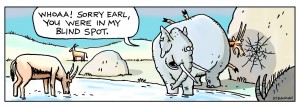Estelle Metayer writes: Businesses can have blind spots and they can be costly, causing companies to overinvest in risky ventures or to fail to take advantage of emerging opportunities. Successful leaders are careful to identify their company’s blind spots and introduce mechanisms to ensure that no harm will come from them.
One common source of businesses’ blind spots is judgment bias. A good example of a company that suffered from this kind of blind spot is Nestlé. For decades, the Swiss multinational defined itself strictly as one the world’s leading food companies. In 2010, however, the company’s CEO, Paul Bulcke, redefined Nestlé as a “nutrition, health, and wellness” company. It was a brilliant strategic decision, allowing the firm to offer dozens of new product lines and services.
Many financial institutions are inadequately prepared to confront the new players entering their markets. Google, which is quietly testing the car-insurance waters, holds a banking license. Meanwhile, Square, Paypal, and the start-up company Affirm are already processing a large share of online payments.
In today’s fast-paced world, it takes only a single technological improvement, price advantage, or great viral advertising campaign for a competitor to leap ahead. New players can materialize seemingly out of nowhere. The taxi company Uber did not exist five years ago; it is now valued at more than $40 billion. The rapid expansion of Alibaba threatens Western retailers who never expected to face a Chinese competitor. Driverless cars and pilotless planes will soon transform many industries.
Another frequent cause of companies’ blind spots is historic bias, or what psychologists call an “anchoring bias” – the assumption that something that was true in the past will continue to be true in the future. A long track record of success can warp executives’ analysis, distort their decision-making, and leave them blind to incipient paradigm shifts or rapid changes in a market.
Overcoming historic biases requires questioning an industry’s taboos. For example, if the creators of television series like Game of Thrones, the most pirated show in history, stopped fighting copyright infringement, they could seize an opportunity. Advertisements directly embedded in the show would reach five million additional – illegal – viewers, in effect doubling their audience.
Guarding against blind spots takes careful thought, but executives and boards can put processes in place to protect against them. For starters, companies should diversify their talent pool.
Executives should make special efforts to break taboos, examine unchallenged assumptions, and question their businesses’ most sacred rules. Even simple methods, like writing down and challenging every assumption on which a company has based its strategy, can yield valuable insights. Every company should assign someone to play the role of “dissenter.” Sometimes called the “China breaker,” this person should be given time during board meetings to throw the good dishware against the wall and see what can be made of the pieces.
Industries are becoming increasingly complex and global competition is mounting. The companies that will be best placed to survive will be those that took the proper precautions to avoid being run off the road.

